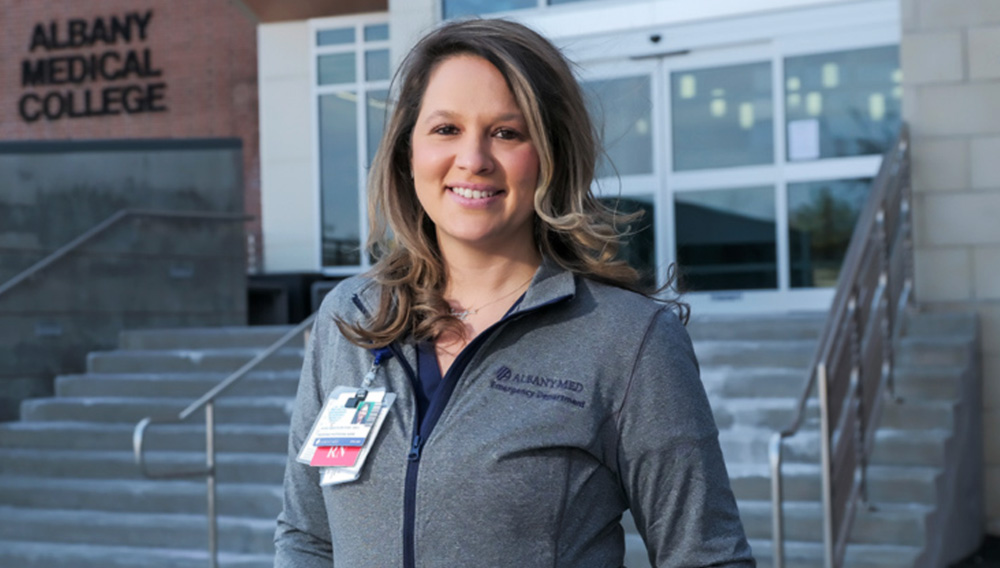
Master of Science in Nursing Education
Master of Science in Nursing Education

An Admissions Counselor
Can Help You:
Finish your degree sooner | Make college affordable | Create a plan to achieve goals
Fill out our 3-Step form to get started
Cultivate Your Passion for Care and Education When You Earn a Master’s in Nursing Education
If you’re a registered nurse who has a bachelor’s degree and a love of teaching, the Master of Science in Nursing Education program prepares you to shape the next generation of nurses and play a vital role in moving health care forward.
Dynamic curriculum and practice experiences prepare you for work in clinical settings; academic settings, such as vocational, associate, and bachelor’s degree nursing programs; and nonacademic settings, including staff-development, school nursing, public health, and nurse recruiting. You’ll be confident advancing your career with the knowledge and skills you need in learning theories, teaching strategies, curriculum development, evaluation of learning outcomes, and education technology.
Don’t have your bachelor’s in nursing yet? Learn more about our RN to MS in Nursing Education dual-degree program.
Dedicated Support
Here for you from start to finish
200,000+ Alumni
Join our global network
Start May 5
Courses start every 8 weeks
PROGRAM DETAILS
Online MS in Nursing Education
- Major Core38 Credits
Master of Science in Nursing Education
- Year 1 - Term 1
-
This course focuses on the theoretical foundations of nursing practice through the exploration of nursing theories, organizational change models, and learning theories. The application of theories relevant to nursing practice will be emphasized. The examination of multiple theories and their implications on nursing knowledge development and practice will serve as a foundation for future graduate courses. In addition to the classroom discussions and written assignments, students will engage in a 1-hour practice experience that will support new understanding of professional practice. This is an 8-week 3-credit hour course requiring a minimum of 18 hours of course engagement each week (refer to the Credit Hour Calculation Policy found in the Student Handbook.) Course engagement includes student activities such as discussions, reading, study time, practice experience, and assignments.Prerequisites
Active and unencumbered RN license.Credit Hours
3Major Requirement
-
- Year 1 - Term 2
-
This course explores historical knowledge development through the examination of nursing as an art and a science. The science of nursing will be examined through the fundamental patterns of knowing and the science of knowing. The masters-prepared nurse will develop the ability to apply ethical and moral reasoning, evidence-based competencies, and leadership strategies to promote innovation and to transform nursing practice. Students will use the spirit of inquiry, combined with personal creativity, and the translation of evidence to enhance interprofessional collaboration.Prerequisites
Active and unencumbered RN license. NUR502 Theoretical Foundations of Nursing Practice.Credit Hours
3Major Requirement
-
- Year 1 - Term 3
-
This course focuses on the development of the nurse as a role model and mentor for the translation and generation of health care evidence in clinical practice. The goals of research, evidence-based practice, and quality improvement will be highlighted, and the principles of each will be applied to the clinical setting. Students will examine personal practice in relation to policy and current evidence, and explore grant writing. The integration of theory, evidence, cultural considerations, leadership, ethics, and clinical judgement when implementing change will be emphasized. The student will develop a knowledge base that will prepare them to collaborate with inter-professional teams and embrace leadership roles that initiate, implement, and evaluate innovative practice changes.Prerequisites
Active and unencumbered RN license.Credit Hours
4Major Requirement
-
- Year 1 - Term 4
-
This course examines public policy, political ideology and ethics as they shape health policy across populations. Political ideology, social and health policy are considered within the lens of population-based health and reducing health disparities. The role of the master s prepared nurse to lead and advocate within the public policy arena is explored and discussed. Contemporary issues in health policy viewed from the perspective of ethics and the social and material determinants of health are considered. A primary focus of the course is consideration and development of the knowledge and skills that the master s prepared nurse needs to be a change agent in health policy. This is an 8 week 4 credit hour course requiring a minimum of 18 hours of course engagement each week (refer to the Credit Hour Calculation Policy found in the Student Handbook.) Course engagement includes student activities such as discussions, readings, study time, and assignments.Prerequisites
Active and unencumbered RN license.Credit Hours
4Major Requirement
-
- Year 1 - Term 5
-
This course is an in-depth study of the pathophysiologic basis of disease as it affects individuals across the life cycle. Emphasis will be placed upon endogenous and exogenous factors which contribute to altered functional balance at the cellular, tissue, organ, and system levels. National and global health disparities caused by genetic, developmental, and environmental factors will be discussed. Assessment findings, diagnostic testing, and interventions specific to selected health problems are explored to begin the development of critical thinking skills for pathophysiologic causes and treatments of given disease processes.Prerequisites
Active and unencumbered RN license.Credit Hours
3Major Requirement
-
- Year 1 - Term 6
-
The purpose of this course is to examine pharmacotherapeutic agents used in the treatment of illness and the promotion, maintenance, and restoration of wellness in diverse individuals across the lifespan. This course will provide the foundation for safe, effective drug therapy and the role of the nurse in health promotion, disease prevention, and management. Emphasis will be placed on the fundamentals of pharmacokinetics and pharmacodynamics as they relate to practice experience. This course includes 9 hours of practice experience through digital virtual patient activities simulating a real patient via Shadow Health.Prerequisites
Active and unencumbered RN license.Credit Hours
3Major Requirement
-
- Year 2 - Term 1
-
This course focuses on the advanced comprehensive assessment of individuals. It builds on the students knowledge and skills and provides a foundation for the advanced practice nurse to evaluate the health of individuals and provide health promotion interventions. The interactions of developmental, biopsychosocial, and socio-cultural contexts resulting in health effects for individuals provide the structure of the course. Students obtain the practice skills necessary for advanced communication (i.e., clinical interviewing, focused history taking), biopsychosocial and physical assessment, critical diagnostic reasoning, differential diagnosis, and clinical decision-making through course readings, dialog, discussions, videos, simulations, and practical examinations. This course includes 45 hours of practice experience hours using virtual clinical simulation.Prerequisites
Active and unencumbered RN license.Credit Hours
3Major Requirement -
This course focuses on the creation of teaching-learning environments and the integration of the role of faculty/educator, uniqueness of the learner, the setting and context within which the learning occurs, the teaching learning strategies used to achieve learning outcomes, and evaluation of the effectiveness of this process.Prerequisites
Active and unencumbered RN license, all Nursing Phase I courses.Credit Hours
3Major Requirement
-
- Year 2 - Term 3
-
This course focuses on curriculum and syllabus/program development, including theoretical frameworks and design, philosophical foundations, and selection of learning experiences to achieve outcomes.Prerequisites
Active and unencumbered RN license, all Nursing Phase I courses.Credit Hours
3Major Requirement
-
- Year 2 - Term 4
-
This course is designed to introduce the student to the evaluation process, including test construction, clinical performance assessment, program evaluation, and strategies for evaluating learning outcomes.Prerequisites
Active and unencumbered RN license, all Nursing Phase I courses.Credit Hours
3Major Requirement
-
- Year 2 - Term 5
-
The graduate nursing capstone is a culminating experience designed to provide learners with an opportunity to apply knowledge and skills acquired throughout the program of study focusing on the competencies of the graduate level nurse. This 6-credit course consists of several integrated components: discussion, reflective journal, scholarly paper, 135 practice experience hours, and project presentation. Assessment of the learner fs attainment of program competencies is built into these components. No additional hours will be awarded beyond the 135 hours. 6.00 Credits. 3 credits allocated to didactic/course work and 3 credits allocated to practice experience.Prerequisites
Active and unencumbered RN license. Capstone is the last course taken, and all major core courses must be completed prior to beginning the capstone. Students can only take an elective or concentration course with the capstone.Credit Hours
6Major Requirement
-
Explore Common Careers

Kaylin Dawson
Master of Science in Nursing Education, 2020
Bachelor of Science in Nursing, 2012
Institutional Accreditation
Excelsior University is an accredited institution and a member of the Middle States Commission on Higher Education (MSCHE or the Commission) www.msche.org. Excelsior University’s accreditation status is accreditation reaffirmed. The Commission’s most recent action on the institution’s accreditation status on June 23, 2022 was to reaffirm accreditation. MSCHE is recognized by the U.S. Secretary of Education to conduct accreditation and pre-accreditation (candidate status) activities for institutions of higher education including distance, correspondence education, and direct assessment programs offered at those institutions. The Commission’s geographic area of accrediting activities is throughout the United States.
All of Excelsior University’s academic programs are registered (i.e., approved) by the New York State Education Department.
ACEN Accreditation
The bachelor’s and master’s nursing programs at Excelsior University are accredited by the:
Accreditation Commission for Education in Nursing (ACEN)
3390 Peachtree Road NE, Suite 1400
Atlanta, GA 30326
404-975-5000
These programs include Bachelor of Science in Nursing, Master of Science in Nursing Leadership and Administration of Health Care Systems, Master of Science in Nursing Education, Master of Science in Nursing Informatics, RN to Master of Science in Nursing Leadership and Administration of Health Care Systems, RN to Master of Science in Nursing Education, and RN to Master of Science in Nursing Informatics.
The most recent accreditation decision made by the ACEN Board of Commissioners for the bachelor’s nursing program in March 2019 is Continuing Accreditation.
The most recent accreditation decision made by the ACEN Board of Commissioners for the master’s nursing programs in March 2019 is Continuing Accreditation.
View the public information disclosed by the ACEN regarding these programs at acenursing.us/accreditedprograms/programSearch.htm.


